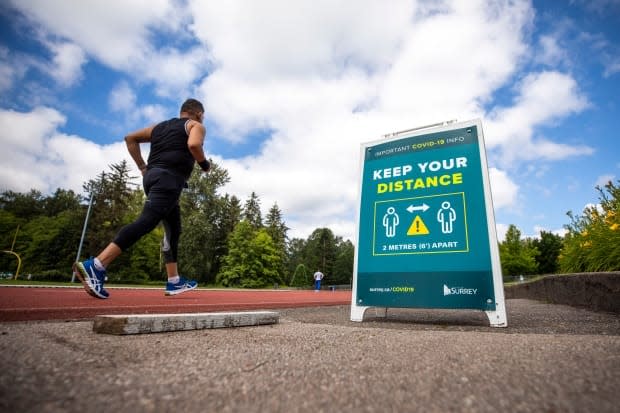Consistency is key to adopting new fitness routines during pandemic, researchers say
Health researchers say British Columbians need to find new ways to get active as the pandemic stretches into its tenth month and the province has implemented new limits on some activities.
Last week, provincial health officials suspended some indoor group fitness classes until Dec. 7 to try to reduce COVID-19 infections.
The continuing uncertainty around how to keep fit safely has thrown some people off exercising entirely, but health researchers in B.C. say it's important to fight against apathy.
"It's not something to sort of push off," said University of Victoria professor Ryan Rhodes, who studies health psychology and how people approach and do exercise.
"We have to accept that this is a new reality and find new routines to get our physical activity going," he said.
National guidelines recommend Canadian adults engage in 150 minutes of moderate to vigorous exercise per week, or what Rhodes describes as "huffing and puffing," to help prevent a range of diseases as well as bolster mental health.

In the spring, both Rhodes and Guy Faulkner from the University of British Columbia worked on different studies looking at how Canadians were exercising during the initial response to the pandemic, which included the shutdown of gyms and recreation centres.
Both found an expected reduction in activity, whether going to the gym or just getting outside. Moderate to vigorous physical activity declined on average by 46 minutes per week for adults, according the study Rhodes worked on.
Of those who were active before COVID-19, around 20 per cent of them were not during the early days of the pandemic.
Those who have stopped exercising and may still be trying to wait the pandemic out before returning are the people researchers like Rhodes and Faulkner are most concerned about.
"The consequences of inactivity are quite extreme," Rhodes said.
Exercise for physical and mental well-being
For 20 years, Faulkner has studied the effect of exercise on well-being and happiness.
Now, in a pandemic with no known endpoint, he says exercise should be a tool to not only stay physically fit, but to bolster mental well-being.
"Mainly as a positive coping strategy for dealing with the stress of the situation that we find ourselves in," he said.
Through their work, both Faulkner and Rhodes have uncovered some interesting trends that have helped people keep moving.
Early in the pandemic, Rhodes found that people with dogs more easily kept up with exercise by walking their pets.
He also found that people who had exercise equipment at home, bought new equipment, or even turned to YouTube for exercise videos fared better.
Faulkner says routines do not need to be complicated. It could be as simple as trying to build in movement throughout the day to reduce sedentary activity.
He takes a brisk walk in the morning and at the end of his working day as a sort of faux commute that many people like him have lost by working from home.
"I think we do need to make a conscious effort," he said.
Pick something you like
Turning new routines into habits could be the toughest part, according to Rhodes.
His research has shown that an activity needs to be repeated four times a week for six weeks before it becomes a part of someone's lifestyle.
It's also important to choose an activity that you actually like doing to help make it stick.
Rhodes has studied how cues, such as exercising at the same time each day, can be effective in turning exercise into a habit.
"Eventually the cue itself promotes the behaviour," he said.


